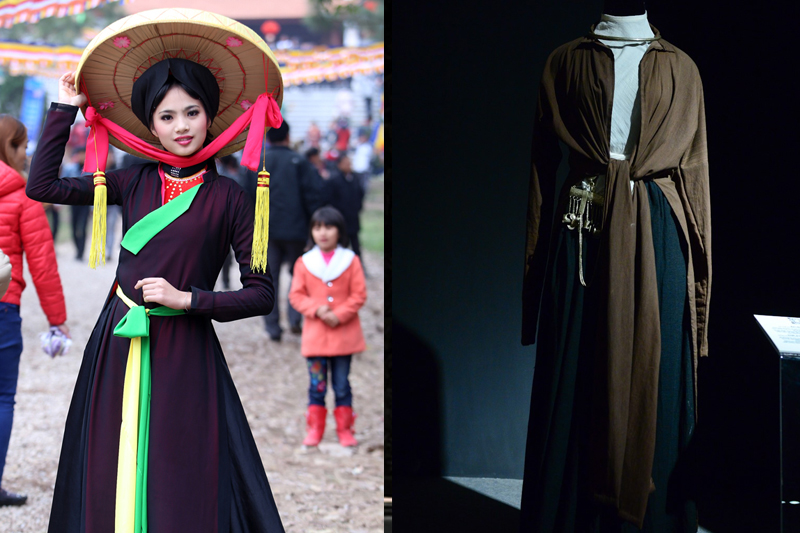Photo: Bao Dan Toc
Vietnam is a multi-ethnic country with 54 ethnic groups and nearly 4,000 years of history, which built up a great culture of diversity and uniqueness, especially traditional costumes. You can know more about the beauty, elegance and characteristics of local people when you look at their traditional costumes. Vietnamese traditional costumes have been affected by many cultures in the world from the past to present.
1. AO DAI (Vietnamese Traditional Dress)
There is no doubt that the Ao Dai is very well-known in Vietnam and the world because this is the most popular traditional costume of Vietnam.
Over the years, Ao Dai went through lots of transformations, affected by Western culture. During French colonialism, a French-trained artist named Cat Tuong, or Le Mur, made a revolution for this outfit design. He combined the western dress style with the traditional ao dai, making it much more fitted and in true colonial style, requiring a tight-fitting corset. During that period, Ao Dai was promoted as the national costume for the modern era. It had many different styles throughout the decades until its appearance in modern time as the simple, colorful and graceful Vietnamese national dress. The modern “Ao Dai” consists of long trousers and a two-flap dress (from waist down, the dress splits into front and back flaps).

Photo: Bao Lao Dong
Nowadays, Vietnamese are familiar with Western clothing, but this traditional Vietnamese dress is still a symbol showing the beauty of Vietnamese culture and remains a very popular garment for formal occasions such as weddings or the New Year celebrations.
For men, since the era of Lord Nguyen, rules to wear “Ao Dai” are not as strict as for women. Nowadays, men occasionally wear it for special events but it’s less popular than for women.
2. NON LA (Conical Palm-Leaf Hat)
Non La (Vietnamese conical palm-leaf hat) is a part of Vietnamese costumes for females. While traveling along Vietnam, a common sight you can come across is that Non La is taken by local ladies, walking along the sidewalk. This conical hat is very handy in a tropical country like Vietnam, especially useful in the countryside. It protects farmers from rain or sunny weather.
Like many other traditional costumes of the country, Non La has its own origin, resulting from a legend which pertained to Vietnam wet rice growing culture. Once upon a time, an elegant goddess descended from the sky to protect human-being from a heavy deluge. She wore a giant hat made of four round shaped leaves stitched together by bamboo sticks. That hat was so large that the people were guarded against all the rain, and brought normal life back to the people. After the Goddess was gone, a temple was built to honor her as the Rain-defending Goddess. Locals tried to make a similar hat to the one that the Goddess had on her head so they went into the forest to find natural and available materials such as palm leaves, bark of Moc tree and bamboo to create the Non La as known today. The Non La has become a daily essential for the farmers on the rice fields, boat men and women on the rivers and local street vendors in big cities.

Photo: Nguyễn Thị Hải Yến
The two most famous types of Non La are the Non La of Chuong Village (30 km southwest of Hanoi) and Non Bai Tho in Hue – the ancient imperial capital of Vietnam. Non Bai Tho literally means ‘poem conical hat’ because each hat has a picture of Vietnamese poem and folklore, written by skillful artisans, which can only be seen under the sunlight. A soft silk tie is attached to the inside of the hat to keep the hat on the wearer’s head firmly.
3. AO TU THAN (Four-flapper Dress)
Before the appearance of the Ao Dai, the Ao Tu Than was worn by Vietnamese women and considered as the country’s most enduring relics. The origin of Ao Tu Than is still a question but its illustration was sculpted on the surface of Trong Dong (copper drum) thousands of years ago.
The basic Ao Tu Than consists of three main parts: the “Yếm” – an ancient bodice worn as an undergarment by women to cover the chest area; a long skirt from the waist; and a flowing tunic worn as the outermost layer. The tunic splits into four flaps, also called “than”: two back flaps sewn together (made up a full flap) and the two front flaps can be tied together by a silk sash tied at the waist as a belt. Originally, Ao Tu Than was dyed with natural colors, like the dye-yam, tropical-almond leaves, or mud. In these modern days, Ao Tu Than is no longer widely used in the local daily life but can be found in several northern-related festivals and events with more vivid colors. Because the bodice and the skirt and the tunic have different color gradients.

Photo: Dong Phuc Song Phu
If you have chance to join in the Lim festival in Bac Ninh Province (1 of the 10 Great Festivals in Vietnam), you can witness the female folk singers wearing this attire with accessories, such as “Khan Mo Qua” – a black crow’s beak kerchief made of heavy fabric, “Guoc Moc” – a pair of wooden clogs and “Non Quai Thao” – a kind of conical hat with fringe hanging at both sides.
4. AO BA BA (The Shirt of Madam Ba)
Although Ao Dai is chosen as Vietnamese national costume, the people in the Mekong Delta (southern Vietnam) have their own traditional clothing – the Ao Ba Ba. This costume is so popular in the southwestern countryside that you can see most of the local people wearing this shirt during their daily activities. While you visit Mekong Delta, you can be impressed by the images of the Ao Ba Ba glimmering under the green coconut groves, in the rowing boats down the rivers, on the monkey bamboo bridges, or between the crowded floating markets.
The Ao Ba Ba is a collarless shirt with a back made of a straight piece of cloth. This elaborate shirt is often paired with long white or black trousers. The colors and materials of this set depend on the combination and the desire of the wearers. Farmers and peasants in the Mekong Delta used to wear black or brown Ao Ba Ba to work on the rice fields because they were both clean and easy to wash. Near the hem, there are two extra pockets that are quite convenient for holding necessary items. Thanks to these conveniences and comfort, Ao Ba Ba is often worn by both men and women in the Mekong Delta in their daily life activities. Particularly in special events or festive occasions, they will choose Ao Ba Ba with lighter colors like white, ash gray. Noble class choose the color of young, pale blue with more expensive fabrics such as silk or satin to show off their richness.

Photo: Collected
Over the years, the basic design of traditional Ao Ba Ba has been kept from generations to generations but refurbished to update new fashion trends.
It’s easily recognized that Ao Ba Ba is usually worn with a checkered scarf (also called bandana). This bandana can be black and white or brown and while, not sophisticated but as a gentle highlight for the wearer’s casual style.
Together with Ao Ba Ba, a conical hat and bandana made up the very distinctive beauty and gentleness of Southern Vietnamese people.
5. Vietnamese traditional costumes of Ethnic groups
In Vietnam, ethnic tribe costumes can vary depending on their own characteristics, but most share a common theme of featuring very colorful and very complicated repeated patterns, with many clashing items worn at once.
5.1 Traditional costumes of H’Mong ethnic group in Vietnam
Traditional costumes of H’mong women are very sophisticated and vibrant, typically made of linen with many highlighted colors and embroidered motifs. A completed outfit consists of a deep V-chest shirt, an overall of two square pieces covering the front and the back, a big belt, a headscarf, leggings, and a truncated cone-shaped gather skirt. Along with the handmade costumes, the women often attach jewelry such as silver earrings, necklaces, bracelets, and rings; which makes them look more beautiful and distinctive.

Photo: Du lich Ho Ba Be
5.2 Traditional costumes of Thai ethnic group in Vietnam
While you take a trip to Vietnam’s northwestern region (Lai Chau, Dien Bien, Son La, Hoa Binh), you will interact with Thai ethnic group and surely be impressed by the Thai women in their traditional attire: a close-fitting blouse and a black long skirt. The cloth belt which connects the blouse and skirt is made of blue, green or pink cloth. The green color goes well with the white blouse and black skirt.
.jpg)
Photo: kiemsat.vn
In addition, the outfit is paired with a sophisticated brocade headscarf (locally called as “Khăn Piêu”) and a few items of silver jewelry, which make the costume more elegant and demure. Traditionally, the black Thai wear a black blouse with a high collar, while the white Thai wear a white blouse with a V-shaped collar. A blouse has two rows of silver buttons in the front: one with female butterfly-shaped buttons and the other with male butterfly-shaped buttons. The interesting fact is that Thai girls wear a blouse with an even number of buttons, while married women dress up the blouse shirt with an odd number of buttons.
5.3 Traditional costumes of Cham ethnic group in Vietnam
The Cham, who have lived along the coast of central Vietnam for a long time, possess a rich culture profoundly influenced by Indian culture. Although Cham’s costume is not as colorful as other clothings in Vietnam, it still has its own charming beauty.
Both men and women wear long one-piece sarongs or cloth wrappers. Men wear shirts fastened down the center with buttons, while women wear long-sleeved pullover blouses. The waistband is tied across the chest and around the waist. It is the attire’s highlight because it is prominently designed with golden iridescent shades and meticulous detail. The Cham women wear the colorful and charming long dresses in major occasions like the Kate New Year festival, the Ramuwan festival, weddings and the celebration of girls’ reaching adulthood. The white colored one is the sole option for attending religious mass. The Cham wear a dress without split flaps because it makes their walk light, flowing and attractive.

Photo: Bao Dan Tri
Headscarf is an indispensable item as it expresses the culture factor, which means that it’s not easy for strangers to make the acquaintance of the Cham women, who are reserved and only express themselves through their eyes, lips and cheeks. A gentle glance or smile can replace a greeting.
Over the years, the modern Cham long dress has been somewhat modified but still retains traditional features. The dress looks better with 2 intertwined embroidered cloth belts, heightening the seductive curves of the wearer’s body.
6. Summary
Vietnamese traditional costumes have been influenced by western fashion trends and replaced by more modern and convenient clothing styles but traditional charm and main characteristics are still preserved. The Vietnamese people still pride themselves on their unique dressing style and culture. And that elegant beauty remains the attraction for travelers when coming to this stunning S-shaped country.
Source: vietnamtravel.com